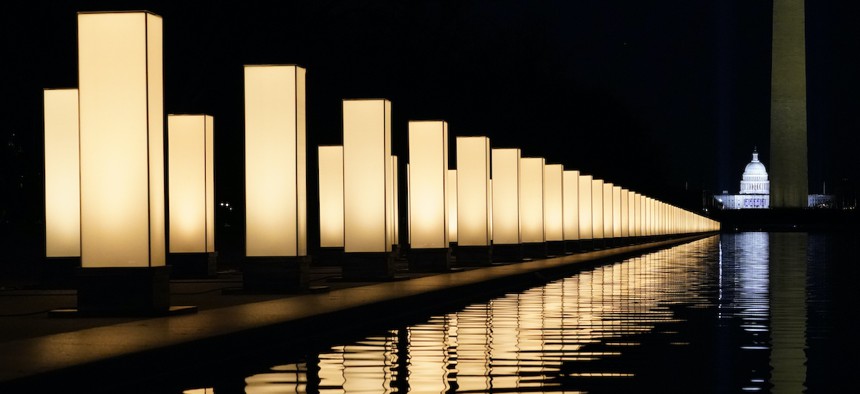Cities and Counties Honor Lives Lost to Covid-19

Lights surround the Lincoln Memorial Reflecting Pool, placed as a memorial to COVID-19 victims Tuesday, Jan. 19, 2021, in Washington, after President-elect Joe Biden spoke, with the Washington Monument and the U.S. Capitol in the background. Associated Press

Connecting state and local government leaders
Communities across the country participated Tuesday in a national Covid-19 memorial, while others have erected more permanent reminders of those who have died during the pandemic.
At 5:30 p.m. Eastern time on Tuesday, government buildings across the country began to light up amber in honor of people who died of Covid-19, part of a national memorial ceremony spearheaded by President-elect Joe Biden’s inaugural committee.
In Houston, they lit interstates, city hall and two airports. In New York, the Empire State Building shone amber; in Seattle, the Space Needle. In Clark County, Nevada, officials illuminated the rotunda at the government center with “up to 29 beams of light—one for every 100 people who have perished locally as a result of the pandemic," according to the county.
“To heal, we must remember. It’s hard sometimes to remember. But that’s how we heal,” Biden said at the reflecting pool at the Lincoln Memorial in Washington, D.C. “It’s important to do that as a nation. That’s why we’re here today. Between sundown and dusk, let us shine the lights in the darkness along the sacred pool of reflection and remember all whom we lost.”
The event, billed as a “national moment of unity and remembrance,” was the first coast-to-coast memorial for victims of the pandemic. But it was preceded by dozens of other memorials in cities and counties across the country—some temporary, some virtual, all of them designed to give grieving people an outlet to celebrate and remember their loved ones.
In Chicago, for example, residents can submit photos and stories of their deceased loved ones to a virtual memorial wall hosted on the city’s website. The wall, unveiled in June, aims to “help Chicagoans cope with the sudden loss of their loved one to Covid-19, but also to celebrate their lives and memories,” Mayor Lori Lightfoot said in a statement. “In light of the current situation, the way we mourn and celebrate one’s life needs to be reimagined.”
Other places have opted for physical memorials. At least three cities in Massachusetts—Lawrence, Plymouth and Newton—placed rows of empty chairs in front of city halls, each representing a resident who succumbed to the virus.
The temporary memorials, modeled after a larger-scale installation near the White House this fall, “represent these lives lost, these Newtonians whose chairs will be forever empty at the holiday table,” Newton Mayor Ruthanne Fuller said in an update before Thanksgiving. “As we pass by, we will remember that each empty chair reflects a life lost … let’s honor each of these people by wearing masks, physically distancing, and doing our part, for each other, to keep our neighbors safe.”
Plans for permanent memorials are underway in several places, including Jersey City, New Jersey, where officials plan to turn a Superfund environmental cleanup site into a park that will include a grove of trees—one for every Covid-19 death—and a wall inscribed with the names of the deceased.
“Essentially, these people were robbed of their lives, and also the ability of their loved ones to properly say goodbye,” Mayor Steven Fulop said on Twitter. “Their names will be listed on a memorial. We said we would do something for this group specifically, and we are.”
Months earlier, in May, county officials in Westchester County, New York, unveiled a permanent memorial for Covid-19 victims, giving residents the opportunity to tie shiny purple ribbons to strings between two wooden poles topped with a shingled roof.
The memorial, a joint project between the county’s parks department and its communications team, originally stood next to the Hudson River in a nature preserve, but was moved indoors in December for safekeeping during the winter. At a ceremony before the move, County Executive George Latimer stressed the importance of remembering that each ribbon represents a life.
“It’s sobering to think that a year ago...those 1,500 people were just as alive as we are today,” he said. “To see people who we love die in the context of a pandemic is, in some ways, harder than any other way, because what took their lives was not visible to us. It was everywhere, and it was nowhere, and it was still there. It’s still here.”
Kate Elizabeth Queram is a staff correspondent for Route Fifty and is based in Washington, D.C.

NEXT STORY: Women Hold Unprecedented Power in Vermont’s Statehouse. This Is How They’ll Lead.




